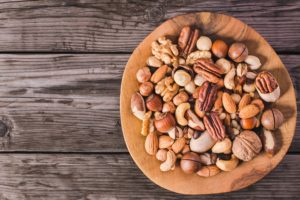
This is the first study of its kind to show a relationship between nut consumption and cognition. Lead researcher Dr. Ming Li explained, “Population aging is one of the most substantial challenges of the twenty-first century. Not only are people living longer, but as they age, they require additional health support, which is placing unprecedented pressure on aged-care and health services. Improved and preventative health care – including dietary modifications – can help address the challenges that an aging population presents.”
“By eating more than 10 grams (or two teaspoons) of nuts per day, older people could improve their cognitive function by up to 60 percent compared to those not eating nuts — effectively warding off what would normally be experienced as a natural two-year cognition decline,” he continued.
The global population is aging, and China has one of the fastest aging populations in the world, with an estimated 330 million Chinese to be over the age of 65 by the year 2050. The World Health Organization estimates that by 2020, the number of people over the age of 60 will outnumber children younger than five.
The researchers explain that nuts contain antioxidants which can help reduce cognitive decline. Dr. Li added, “Nuts are known to be high in healthy fats, protein, and fiber with nutritional properties that can lower cholesterol and improve cognitive health. While there is no cure for age-related cognition decline and neurogenerative disease, variations in what people eat are delivering improvements for older people.”
Changes in cognition are normal with aging, but dementia and Alzheimer’s are debilitating diseases. Finding natural ways to help slow down memory decline can help preserve a person’s quality of life for many years. Therefore, it may be wise to add more nuts to your daily diet as a mean of preserving your memory.




